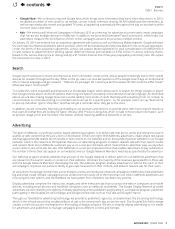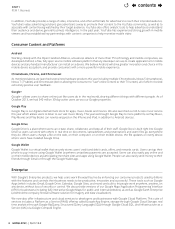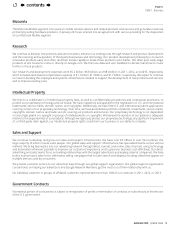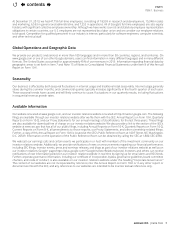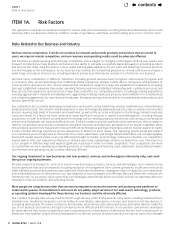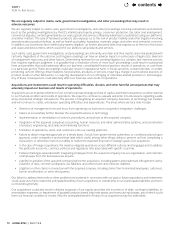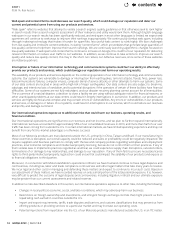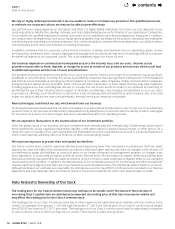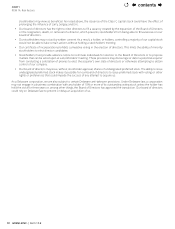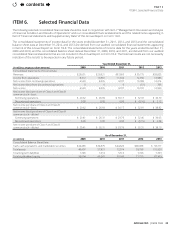Google 2013 Annual Report Download - page 19
Download and view the complete annual report
Please find page 19 of the 2013 Google annual report below. You can navigate through the pages in the report by either clicking on the pages listed below, or by using the keyword search tool below to find specific information within the annual report.13GOOGLE INC.
ITEM1A.RiskFactors
Regulatory authorities around the world are considering a number of legislative and regulatory proposals concerning data protection.
In addition, the interpretation and application of consumer and data protection laws in the U.S., Europe and elsewhere are often
uncertainandinux.Itispossiblethattheselawsmaybeinterpretedandappliedinamannerthatisinconsistentwithourdata
practices.Ifso,inadditiontothepossibilityofnes,thiscouldresultinanorderrequiringthatwechangeourdatapractices,
whichcouldhaveanadverseeectonourbusinessandresultsofoperations.Complyingwiththesevariouslawscouldcauseus
to incur substantial costs or require us to change our business practices in a manner adverse to our business.
We face a number of manufacturing and supply chain risks that, if not properly managed, could adversely impact our
We face a number of risks related to manufacturing and supply chain management. For instance, the products we sell may have
quality issues resulting from the design or manufacture of the product, or from the software used in the product. Sometimes,
these issues may be caused by components we purchase from other manufacturers or suppliers. If the quality of our products
does not meet our customers’ expectations or our products are found to be defective, then our sales and operating earnings,
and ultimately our reputation, could be negatively impacted.
Werelyonthirdpartiestomanufacturemanyofourassembliesandnishedproducts,andwehavethird-partyarrangementsfor
thedesignofsomecomponentsandparts.Ourbusinesscouldbenegativelyaectedifwearenotabletoengagethirdparties
with the necessary capabilities or capacity on reasonable terms, or if those we engage fail to meet their obligations (whether due to
nancialdicultiesorotherreasons),ormakeadversechangesinthepricingorothermaterialtermsofourarrangementswiththem.
In the past, Motorola, like many electronics manufacturers, has experienced supply shortages and price increases driven by raw
materialavailability,manufacturingcapacity,laborshortages,industryallocations,naturaldisastersandsignicantchangesin
thenancialorbusinessconditionofitssuppliers.Workaroundplanstoaddressshortageshaveentailedinthepast,andcould
entail in the future, increased freight costs for expedited shipments. We cannot assure you that we will not experience shortages
or other supply chain disruptions in the future or that they will not negatively impact our operations. In addition, some of the
components we use in our products are available only from a single source or limited sources, and we cannot assure you that we
wouldbeabletondreplacementvendorsonfavorabletermsoratallintheeventofasupplychaindisruption.
Additionally, because many of our supply contracts have volume-based pricing or minimum purchase requirements, if the volume
of our hardware sales decreases or does not reach projected targets, we could face increased materials and manufacturing
costsorothernancialliabilitiesthatcouldmakeourhardwareproductsmorecostlyperunittomanufactureandthereforeless
competitiveandnegativelyimpactournancialresults.Further,certainofourcompetitorsmaynegotiatemorefavorablecontractual
terms based on volume and other commitments that may provide them with competitive advantages and may impact our supply.
We also require our suppliers and business partners to comply with law and company policies regarding workplace and employment
practices, environmental compliance and intellectual property licensing, but we do not control them or their practices. If any of
them violates laws or implements practices regarded as unethical, we could experience supply chain disruptions, canceled orders,
terminations of or damage to key relationships, and damage to our reputation. If any of them fails to procure necessary license
rights to third-party intellectual property, legal action could ensue that could impact the salability of our products and expose us
tonancialobligationstothirdparties.
TheDodd-FrankWallStreetReformandConsumerProtectionActincludesdisclosurerequirementsregardingtheuseof“conict”
mineralsminedfromtheDemocraticRepublicofCongoandadjoiningcountries(DRC)andproceduresregardingamanufacturer’s
eortstopreventthesourcingofsuch“conict”minerals.SECrulesimplementingtheserequirementsmayhavetheeectof
reducingthepoolofsupplierswhocansupplyDRC“conictfree”componentsandparts,andwemaynotbeabletoobtainDRC
conictfreeproductsorsuppliesinsucientquantitiesforouroperations.Sinceoursupplychainiscomplex,wemayface
reputationalchallengeswithourcustomers,stockholdersandotherstakeholdersifweareunabletosucientlyverifytheorigins
forthe“conict”mineralsusedinourproducts.
If our security measures are breached, or if our services are subject to attacks that degrade or deny the ability of users to
access our products and services, our products and services may be perceived as not being secure, users and customers
Our products and services involve the storage and transmission of users’ and customers’ proprietary information, and security breaches
expose us to a risk of loss of this information, litigation, and potential liability. We experience cyber attacks of varying degrees on a regular
basis, and as a result, unauthorized parties have obtained, and may in the future obtain, access to our data or our users’ or customers’
data. Our security measures may also be breached due to employee error, malfeasance, or otherwise. Additionally, outside parties
may attempt to fraudulently induce employees, users, or customers to disclose sensitive information in order to gain access to our
dataorourusers’orcustomers’data.Anysuchbreachorunauthorizedaccesscouldresultinsignicantlegalandnancialexposure,
damagetoourreputation,andalossofcondenceinthesecurityofourproductsandservicesthatcouldpotentiallyhaveanadverse
eectonourbusiness.Becausethetechniquesusedtoobtainunauthorizedaccess,disableordegradeservice,orsabotagesystems
change frequently and often are not recognized until launched against a target, we may be unable to anticipate these techniques or
to implement adequate preventative measures. If an actual or perceived breach of our security occurs, the market perception of the
eectivenessofoursecuritymeasurescouldbeharmedandwecouldloseusersandcustomers.
contents


